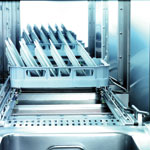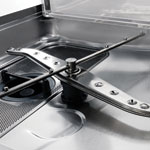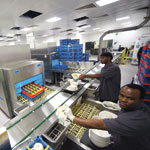Choose the right kit to keep things clean
Chefs do not get as excited about cleaning as they do about cooking, but in fact the dishwasher is one of the most important items in the kitchen and it's essential to buy one that suits your needs exactly. Diane Lane reports
Nobody likes dirty plates. But businesses can't afford to hold limitless stock, so the clean turnaround of tableware and glassware is vital to a restaurant's efficient operation. This means specification of a dishwasher or glasswasher should be an acquisition that is given as much consideration as a cooking range or combi-oven. Getting it wrong can be a very costly mistake.
Mike Butt, managing director of Dawson Foodservice Equipment, supplier of the Comenda brand including the new AC2 Range of compact rack machines, says operators can sometimes be overwhelmed when it comes to choosing machines. "In some instances, for smaller machines such as undercounter glass and dishwashers, the decision-making process is much quicker and simpler for the end-user, but there are still many factors to consider before committing to a new make or model," he says.
"Where rack and flight dishwashers are concerned, traditionally this has been a very complicated area of the catering facility to understand and interpret to then make the correct choice."
"The three main factors that influence the purchasing decision that we see on a day-to-day basis are: specification - the hours of operation, covers and type of items to be washed; price; and whether the product has a ‘green' offering."
The pressure on caterers to reduce costs and also the carbon footprint of their kitchens has had a considerable effect on the warewashing market, according to Stuart Flint, sales director at Electrolux Professional. He says: "It's no surprise that the warewashing market has become so competitive and the products so finely honed. This makes choosing the right warewashing equipment all the more important - there's no point buying an enormous dishwasher which isn't then used to its full potential in the kitchen.
"I would advise that caterers keep track of how many dishes are used throughout the day and how many are likely to need washing each hour, allowing, of course, some leeway for those extra-busy periods. Depending on the size of the kitchen and the number of covers it provides, caterers need to distinguish whether or not they require a hood-type dishwasher or a larger modular rack-type. For example, the Electrolux Professional hood-type dishwasher will wash 1,200 dishes each hour with the modular rack type doing up to 300 baskets - or around 6,000 dishes."
Nick Burridge, sales director at Classeq, says operators should ensure they have a warewasher that keeps handling of dirty items to a minimum. "A simple front-loading machine is suitable for small operations and coffee shops, small fast-food places or anywhere where there is a small volume of dirty plates, whereas pass-through machines are ideal for the faster-paced restaurant, hotel or conference centre. For example, the front-loading Classeq DUO400 cleans through nine plates per rack and 20 racks per hour, while the Hydro Series of pass-through machines can serve up to 18 plates per rack and 40 racks per hour."
The company's Alto Range rack machines, which carry 18 plates per rack, are generally tailor-made to specific business needs, from fast-moving canteens and school operations to nursing homes and hospitals where constant reliability is needed with the capacity to handle vast amounts of warewashing at all times.
Reliability is a key issue for Bob Wood, director at DC Products. "It's absolutely critical that the machine performs immaculately time and time again, day in and day out as even short periods of downtime could cause a great deal of stress and potentially lost revenue," he says.
"Within any busy environment, functionality and accessibility of the warewasher is paramount. It needs to be easy to use - and to be used by a wide range of staff - so avoid overly complicated machines."
Tim Bender, UK sales director for warewashing at Hobart UK, says there are factors a customer needs to bear in mind that may influence not just the type of machine but also the specific features of a model that will deliver the best performance and results for their business.
He explains: "A dishwasher that is used for one hour per day may not need to have all the features that a machine being used eight hours a day might have. For instance, a Hobart dishwasher fitted with Genius X2 active filtration will be able to operate much longer without draining and refilling than a machine with a basic filter system."
For bars, one feature to consider is low-temperature glasswashers, says Paul Crowley, marketing manager for Winterhalter. The company's ReTemp models (part of its UC Series of undercounter warewashers) wash at 40°C instead of the standard 65°C using specially developed detergent and rinse aid.
Crowley says: "There are three key benefits: first, the lower temperature delivers cooler glasses, so in busy periods they can be used almost straight after washing, with no need to cool. This saves on the number of glasses required, which in turn reduces the amount of storage space needed behind the bar.
"Second, low-temperature models contribute to a more pleasant environment in the workplace, since much less water vapour escapes when the door is opened at the end of the washing cycle. Third, lower-temperature washing means the glasswasher saves energy and costs much less to operate, since the lion's share of running costs are normally taken by heating the wash water."
John Nelson, managing director at Nelson Glass & Dishwashing, advises operators to look for features that ensure the machine gives optimum service at all times. "Look at features that will help prevent breakdowns, such as good filtration systems, and features that will help ensure optimum use, such as built-in, automatic detergent and rinse aid dispensers," he says. "If you run a multi-staff operation and no single person has responsibility for cleaning the machine, one with a self-clean function could prove invaluable."
Ensure the machine is easy to use
"It was important to us to choose a reliable machine from a company that offered a good after-sales service as we can't afford for it to be out of action," he says. "Also, English is not the first language of some of the kitchen staff so we needed a machine that was easy to use."
The machine chosen was a Winterhalter MTR2 130, a compact two- tank rack conveyor dishwasher designed to take care of all the dishwashing needs of a high-volume catering kitchen. Sited in the main kitchen, the new Winterhalter is working from 8am till 10.30pm. On a busy day it needs to process about 250 covers, plus glasses and sundry items from the bar, and can wash from 115 to 130 (500mm x 500mm) racks per hour. The physical size of the machine versus throughput was another deciding factor in favour of the MTR2, as space in the kitchen is limited. The generous clear entry height of 460mm and pass-through width of 500mm also allows large serving and preparation dishes to be cleaned.
The MTR 2 automatically cleans itself, adjusts the rinse temperature, adjusts the wash pressure, turns itself off when empty and gets itself ready for the next shift. Milne says: "It's the speed and the quality of the wash that is important and the MTR delivers both of these. Its built-in cleaning programme is another bonus and routine maintenance is simple."
a decent dishwasher will maintain exacting standards
The pub, which has two AA rosettes and glowing reviews from critics, caters for around 400 diners a week, with each service generating about 500 items for washing. "We are meticulous about hygiene and depend on our dishwasher to help us maintain our exacting standards day in, day out. I've seen the chaos a dishwasher breakdown or malfunction can cause and I don't want it in my kitchen so, in my view, a truly reliable and efficient dishwasher is absolutely essential for a busy, professional kitchen."
Having been impressed with a Nelson dishwasher in the past, both in terms of reliability of the machine and by the company's attentive service and support, King returned to Nelson for its replacement and chose the new Advantage pass-through, not least because of its water and energy-saving features. Another selling point was its capacity to take 500mm x 600mm baskets rather than the usual 500mm square ones, meaning that it can hold 30% more dishes.
"Being environmentally friendly is really important to us," King says. "We grow a lot of our own vegetables and herbs, raise many of our own animals and get what else we need as close to home as possible. Also, we recycle and compost virtually everything. Therefore, it was important to choose our new dishwasher with the same philosophy, so the Advantage ticked every box. It's even better than the last machine and plates come out gleaming looking like they've just been polished."
Cleaning up after the crowds at Westfield Stratford
"Westfield Stratford City can cater for up to 16,000 covers daily," says food and beverage manager Charlotte Slater. "It is a priority to clear the tables as quickly as possible. There are 1,100 seats in the Gallery but in the run-up to Christmas we could see Westfield hitting 16,000 covers."
When diners have finished with their meals, their crockery, cutlery, glassware and trays are placed on clearing trolleys and transported into the adjacent central wash-up area, where they are loaded on to a Meiko twin-cord conveyor to the feeding sections of the glass, dish and combined tray and cutlery washing machines for processing.
Installed within the wash-up are three Meiko M-iQ washing machines. An M-iQ basket transport machine deals with glassware that is removed from the passing tray and loaded into the purpose-built washing baskets for passage through the machine, which has also been fitted with reverse-osmosis rinsing for sparkling, spot-free results. Baskets are colour coded for different glassware and have also been tailored to different internal configurations to suit the different ware. The colours help restaurant staff easily find what they need for their individual restaurant.
An M-iQ flight washing machine deals with the crockery, which is placed by the operators directly between the fingers of the conveyor belt. Cups are also handled on this machine and, when placed into the compartment washing baskets, are loaded directly on to the conveyor belt.
The third machine at the end of the line deals with the trays and cutlery, with the cutlery being lifted by a rotating magnetized belt and dropped directly on to the dedicated cutlery washing line of the two-track machine. The tray is then automatically loaded on to the washing line feeding section. At the clean end, an automatic tray-stacking unit receives up to 120 trays and the cutlery falls into collection boxes and is removed to Meiko purpose-designed and built noise-deadened cutlery sorting tables.
Contacts
CESAwww.cesa.org.uk
Classeq 0844 225 9249
www.classeq.co.uk
Dawson Foodservice Equipment
01226 350450
www.dawsonmmp.co.uk
DC Products 01749 870055
www.dcproducts.co.uk
Electrolux Professional 0844 375 3444
www.electrolux-professional.co.uk
Hobart 0844 888 7777
www.hobartuk.com
Meiko 01753 215120
www.meiko-uk.co.uk
Nelson Glass & Dishwashing 020 8993 6198
www.nelsonwash.co.uk
Winterhalter 01908 359000
www.winterhalter.co.uk










